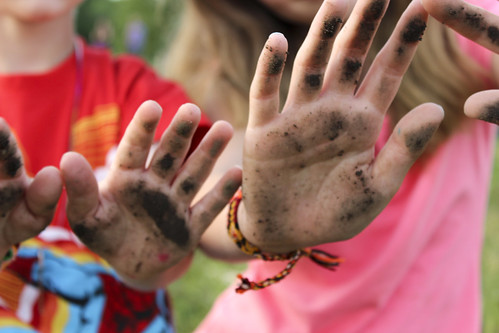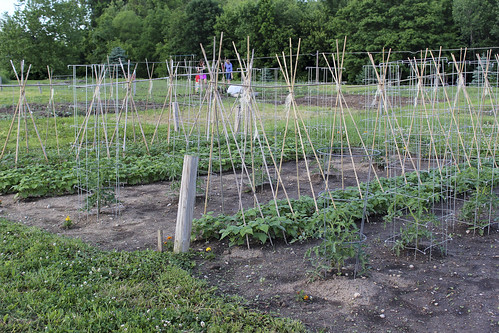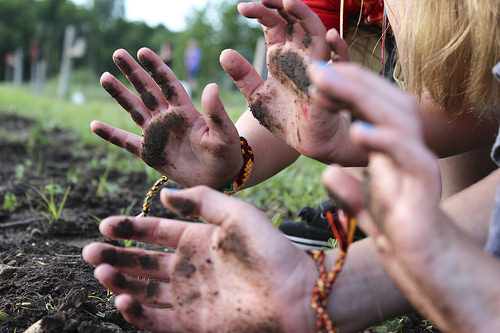 Getting your flu vaccine is important to help prevent or lessen flu severity symptoms. Most people know proper hand cleaning reduces the transmission of illnesses such as the common cold or flu. On the other hand, getting them dirty in the soil helps cultivate stronger immunity. Exposure to the enriched bacterial, fungal, parasitic-laden dirt makes your immune system more robust. Does that make you want to dig in? It should, and here is why.
Getting your flu vaccine is important to help prevent or lessen flu severity symptoms. Most people know proper hand cleaning reduces the transmission of illnesses such as the common cold or flu. On the other hand, getting them dirty in the soil helps cultivate stronger immunity. Exposure to the enriched bacterial, fungal, parasitic-laden dirt makes your immune system more robust. Does that make you want to dig in? It should, and here is why.
As soon as we are born, the skin and gut start to colonize with bacteria from the environment. This bacterial agriculture is essential to immunity development. If this did not occur, the infant’s survival would be at risk. Children are born with passive immunity from mom, but that will not stick around; they need to develop their own to continue to live. The exposure to good, bad and ugly pathogens are essential to mature an immune system and it is now believed to reduce other chronic illnesses such as asthma and allergies.
In time, trillions of bacteria will colonize on the skin, and in mucous membranes and intestines. Over 1,000 different species of bacteria will eventually take residence in the gut alone. An adult can have up to 2-3 pounds of bacteria in the intestines. These gut microbes go to work on an array of tasks from digesting hard-to-digest fibers to cultivating immune health to influencing your metabolism.
Alterations in the bacterial gut flora can affect hormones, such as insulin, that regulate hunger and energy. A healthy intestinal microbe community is vital, which is why the medical community is so excited about the positive results of…brace yourself…fecal transplants! As disgusting as it sounds, doctors transplant fecal matter from a healthy person to an ill person to cure certain problems such as antibiotic-resistant C. difficile.
Once your immune system matures, does it stay that way? Well, the basic mechanisms do, but over time, if it is not continually being challenged, it will weaken.
Do you know people who are constantly washing their hands and surfaces with disinfectants? They avoid touching doorknobs, stair railings and other community surfaces? They are not challenging their immune system.
If you think of your immune system as your personal entourage of bodyguards, you would want your bodyguards fit and equipped to protect you against harm. For them to be effective and efficient at this, they need to train and learn new skills. No one wants lazy, clueless, ill-equipped bodyguards working for them. That is why exposure to pathogens like bacteria, viruses and fungi keeps your defense mechanisms on their toes.
Believe me, I do appreciate society’s advances in disease prevention. We have been successful in decreasing morbidity and mortality with sanitary water, proper waste management, food-borne illness prevention, pasteurization, antibiotics and vaccines. However, in the Western world we have become obsessive with cleanliness to the point that we have been causing more health harm. Not to mention the overuse of antibiotics creating antibiotic-resistant ‘super-bugs.’
Have you heard of the ‘Hygiene Hypothesis’ phenomenon? It’s quite interesting.
 Two major theoretical epidemiological associations have been made. First, they found that countries with a decline in pathogen-causing illnesses from bacteria, viruses and parasites, such as the Western civilization and other developing countries, had an increase in certain chronic illnesses. Allergies, asthma, atopic dermatitis and autoimmune disorders such as type 1 diabetes, multiple sclerosis and inflammatory bowel diseases like Crohn’s and ulcerative colitis are much more common in developed countries. I was shocked to read that parasite exposure was associated with decreased inflammatory bowel disorders such as Crohn’s disease.
Two major theoretical epidemiological associations have been made. First, they found that countries with a decline in pathogen-causing illnesses from bacteria, viruses and parasites, such as the Western civilization and other developing countries, had an increase in certain chronic illnesses. Allergies, asthma, atopic dermatitis and autoimmune disorders such as type 1 diabetes, multiple sclerosis and inflammatory bowel diseases like Crohn’s and ulcerative colitis are much more common in developed countries. I was shocked to read that parasite exposure was associated with decreased inflammatory bowel disorders such as Crohn’s disease.
Second, they found that children exposed to bacteria, viruses, parasites, dust, dirt, animals, siblings, and daycare centers in early childhood had a decline in allergies, asthma, atopic dermatitis and autoimmune disorders in spite of genetic, nutrition, economic and pollution variances. This is why the ‘Hygiene Hypothesis’ has gotten so much buzz from major medical sources such as the New England Journal of Medicine.
Therefore, use common sense with hand washing. Keep washing your hands with antibacterial soap after digging in the dirt. Here comes the disclaimer: soil does have dangerous pathogens such as tetanus, botulinum and anthrax that can cause serious harm, especially if you have a compromised immune system. Therefore, you should consult with your doctor before digging.
Obviously, wash your hands in high-risk situations such as after using the bathroom, changing a diaper, preparing meals and after touching raw meat. Healthcare employees, daycare workers and food preparers need to be washing their hands frequently.
After reading all of this, let’s get back to playing in the dirt as we did when we were kids. You can still start a garden in July. If you do not have a spot of your own, the Greenwood Community Garden is perfect! It is located along Fry Road between U.S. 31 and State Road 135. A 20-foot-by-20-foot plot rents for $20 for Community Center members, $25 for city residents and $30 for non-residents. Returning members can return to their favorite plots, if they register by March 1. Newcomers can rent remaining plots beginning March 1.
You can find this information at greenwood.in.gov. Search for community garden. To sign up, click the ‘garden application’ link.
We need to get over our germ-a-phobia. You need all the friends and foes to mature and challenge your immune system. Remember, healthy gut microbes are vital to support digestion, metabolism and the immune system. Get outside, get your hands dirty and cultivate your immunity.





